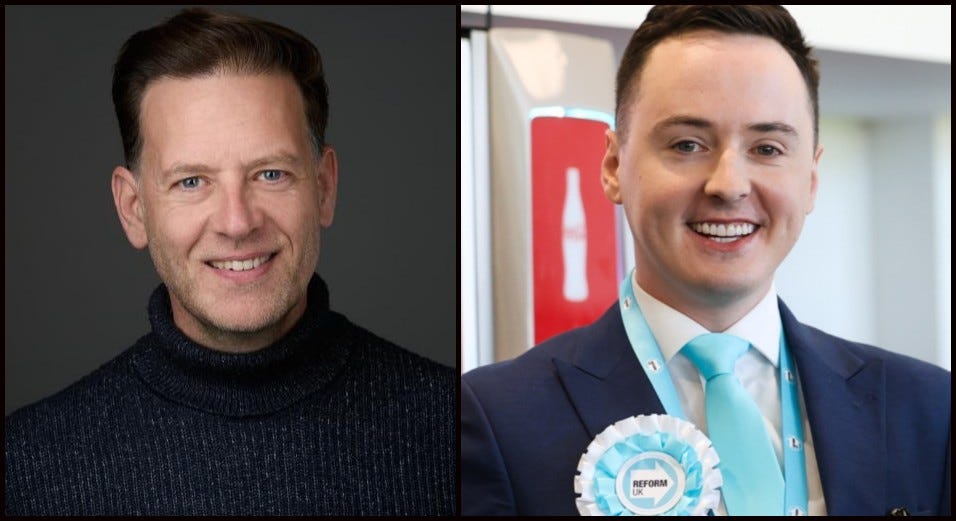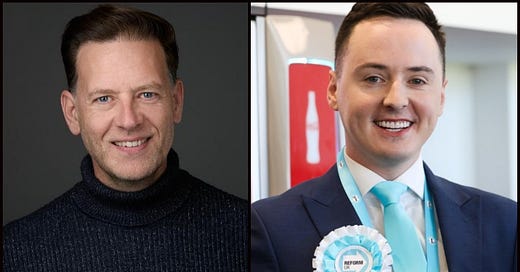Reform in power in Durham: How's it going so far?
OPINION & ANALYSIS: Events in Durham since the May elections constitute an important case study in the new party’s readiness for government. Professor Bob Hudson takes a look
Before beginning today’s edition, could I please ask you to seriously consider pledging your support for Eyes & Ears, just like the person above has. And below. No payment will be taken. Should I decide to switch on payments, then you will be told in advance and given the chance to cancel.
The pledge is the best way of demonstrating to potential sponsors that you value quality, independent regional journalism. Sponsorship could help keep the subscriptions free and allow me to deliver concise, curated news, compelling features and informed opinion columns, all done with integrity, wit and regional pride.
A quick word
Many people will know that Professor Greta Defeyter, founder of the Healthy Living Lab, is a remarkable woman. Far fewer, I suspect, will know just how remarkable. QT columnist Arlen Pettitt interviewed her for an article in Pattern. He said: “She's overcome personal trauma and been motivated consistently by a desire for social justice. She's run away to live on a commune in the Florida Keys, been jailed for protesting against apartheid, met Nelson Mandela twice, and fled across the US border with her newborn baby.” A recommended read.
Michelin-starred chef Kenny Atkinson is to open his first London restaurant, Solaya, on the 25th floor of art’otel London Hoxton. Kenny, who is the owner and chef patron at Newcastle restaurants House of Tides and Solstice by Kenny Atkinson, will oversee the menu and concept creation.
Campaigners who have been lobbying for a pharmacy in the Chillingham Road area of Newcastle for 16 months can celebrate. Heaton councillor Lara Ellis emailed the good news to Jack Arthurs, who wrote about the issue in The QT last March. He said: “Heartening that if enough people make enough noise, bureaucratic decisions affecting the most vulnerable members of our community, can be reversed.”
Kynren has welcomed over 400,000 visitors and added £65.5m to the local economy since it opened 10 years ago. An equally impressive stat from their social and economic impact report is that 95% of the 1,000 volunteers who took part last year will be performing at tonight’s opening performance. The report highlights how being an “Archer” (Kynren’s term for its volunteers) significantly boosts wellbeing, confidence and social connection.
Run Geordie Run, Mark Allison, has called a premature end to his charity run across the US. From his ankles up, he was in good shape, but his feet… Mark’s fundraising was inspired by Forrest Gump, a film he watched when his mum was receiving treatment for lung cancer in 1994. The end point of his final mile this week was where the fictional character, played by Tom Hanks, decided to end his epic run. Mark said: “In the movie, Forrest then returns home and lives a happy life with his Jenny. That is exactly what I intend to do. There is no regret or disappointment in me at all. There is simply gratitude and pride at a job well done.” You can donate to his fundraising efforts for St Benedict’s Hospice here.
Good cop, bad cop?
Bob Hudson, Visiting Professor at the University of Sunderland, analyses the first few months of Reform’s leadership of Durham County Council.

The local elections in May delivered a political earthquake: the Conservatives lost 675 seats, Labour lost 189 and Reform gained 677. The latter gained control of 11 unitary and county councils plus the mayoralties in Greater Lincolnshire and Hull and East Riding.
Nigel Farage kicked off his victory tour in Durham where he advised all council staff working from home or on diversity issues to ‘seek alternative careers’. Such hubris was built on the back of Reform’s astonishing capture of the council - 65 seats out of the 98 available, and Labour left with only four councillors.
Events in Durham since the May elections constitute an important case study in the new party’s readiness for governance. It may be early days, but what do we know so far? Is it, as suggested by the former Newcastle United owner, Sir John Hall, ‘a moment in history’? Or could it turn out to be just some dubious wandering down a political Salt Path?
Early mishaps
As in other parts of the country, there have been some early political mishaps in Durham. A Reform councillor was required to resign after it was revealed he was an employee of the council – a rudimentary error. Another was found to be too ill to barely commence his term.
Elsewhere, old media posts came back to haunt, such as the Reform councillor who had called for all Muslims to be ‘nuked’ . No further action seems to have been deemed necessary in his case. Given all of this, it is surprising (or perhaps a measure of desperation) that candidates previously blocked by the party’s vetting procedures have been encouraged to reapply.
With each by-election costing the authority over £20,000, the cost-cutting mission got off to a poor start. These early missteps allude to the inevitable lack of preparedness for office when a governing party is so devoid of political experience. And whereas the campaigns by other parties relied upon the traditional foot soldiers knocking on doors and providing information about the candidates, the Reform campaign was limited to paid-for postal literature profiling Nigel Farage himself rather than the local candidates. There may be some dispiriting lessons in this for the future of local political campaigning.
Initial caution
Given this fraught baptism, some initial conciliatory noises seemed a sensible approach. These have been duly provided by the new leader of the council, Andrew Husband. In a rebuke to his national leader, he declared that ‘What Nigel says can be true, but he delivered it in a more dramatic way’ and that it would be ‘naïve’ to make drastic decisions on his national leaders comments. Indeed, Husband has stressed the importance of maintaining ‘the hearts and minds of everyone connected to the council, from cleaners to grass cutters.’
However, if Husband plays the good cop, the role of bad cop has been enthusiastically embraced by the new deputy leader of the council, Darren Grimes, who arrives with a chequered past including receiving (as a student) £675,000 of Vote Leave money in his bank account and a controversial spell as a presenter on GB News. As well as being deputy leader, Grimes is the portfolio holder for finance, policy, and communications – key tasks for the new administration.
Performative politics
Grimes has wasted no time in delivering a ceaseless stream of invective on his many social media accounts, all of them popular and monetised. Much of this relates to performative political actions by the council. The repertoire includes:
The Changing of the Flags: One of the first acts of the new council was to remove the Ukrainian and LGBTQ flags from the County Hall grounds and replace them with the union jack and the flag of St George.
Renaming Departments and Committees: Several key departments have been renamed to remove references to climate change, equality and inclusion – neighbourhood and climate change is now neighbourhoods and environment, while equality and inclusion is now stronger communities and belonging.
Miners Gala Attendance: A decision by the organisers of the Durham Miners Gala to ban Grimes from attending the event played right into his hands and grabbed the regional headlines. He went anyway and greatly enjoyed playing the injured martyr.
Attending Local Surgeries: Grimes faced allegations of misleading voters after he claimed police had advised him not to hold local surgeries with his constituents because of security concerns. No such concerns had been raised with or by the police.
Social Media Dog Whistling: Keeping full track of Grimes’ social media offerings is an impossible task. Many of them amount to divisive dog whistling, such as his remark that the recent heatwave had him ‘sweating like a Labour-run council in a rape gang inquiry’. Remarkably, he was exonerated on this matter by the council on the grounds that he had posted as Darren Grimes, not Councillor Darren Grimes.
This has now come to a head with Reform councillors (all resplendent in MAGA-style caps) voting for Durham to become the first local authority (from a group of over 300) to rescind a 2019 declaration of a climate emergency. Revelling in the national attention, Grimes set up a false dichotomy between climate change and social care – ‘wheelchairs not windmills’ as he put it – in a display of pure Trump posturing.
Is there any serious change?
While the regional (and indeed national) media salivate over these manufactured furores, is there any sign of real policy movement? If it is to be found, it will be with the aspiration to emulate Elon Musk’s cost-cutting Doge model at local level with ‘teams of software engineers, data analysts and forensic auditors’. Zia Yusuf, Reform’s Doge supremo, has already paid a visit to Durham, to pursue this agenda..
On this front there is little to report. A five-point mission statement has been issued that identifies the following: ensuring taxpayers’ money is spent wisely and well; making County Durham the best place to do business in the North East; building communities that are connected, clean and thriving; caring for those who need support; and practical, not ideological, environmental stewardship. The missions are not dissimilar to those held by other political parties and read as if they have been generated by ChatGPT.
The reality is that Reform in Durham faces the same dilemma as every other local council – falling funding, high levels of debt (£400 million in Durham), rising demand and legal obligations to deliver services. The bulk of expenditure goes on adult and children’s social care, SEND school pupils and homelessness, supplemented by vital public services like libraries, youth services and waste collection.
A recent analysis of the prospects for Doge savings by Politics Home unsurprisingly concluded that Reform councillors ‘will find themselves confronted with the same brutal trade-offs that other local authorities have been dealing with for 15 years’.
However, one area where there are signs of a genuine policy shift is the reduction in council tax support for the poorest residents of the county. Currently the council is consulting on four options for slimming down its Council Tax Reduction Scheme with a view to saving between £3.8m and £10.35m annually.
This will be an unpopular move, leading to the charge that Reform cares little for the most vulnerable. And bizarrely, the Cabinet lead for this policy is herself a CAB advice worker in Durham, which could lead to some challenging ethical dilemmas.
Policies like this are the juncture where campaigning meets governing. The outcome matters not only for residents of Durham but more widely. As Nigel Farage looks to build Reform into a party whose support can be counted in the 30%+ range, he needs to make it palatable to a wider base. The ways in which Durham and the other Reform councils and mayoralties behave will be an important factor in how this plays out.
The strategy to date has been to pluck low-hanging fruit and make a lot of media noise. Tougher decisions lie ahead.
Bob Hudson is Visiting Professor in Public Policy, University of Sunderland.







